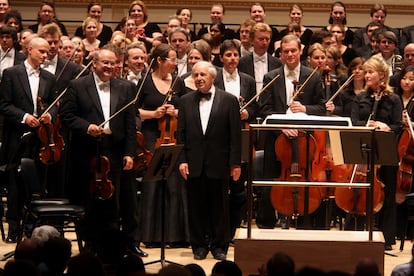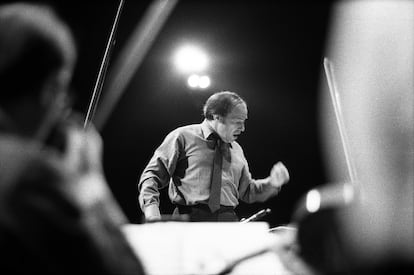On March 26, 1925 he was born in Montbrison, a town in the interior of France, which was going to become the significant figure of the musical renewal. Very little is known about the personal and intimate biography of Pierre Boulez, the Gran Pierre de France. Among the little known, which he studied in his town secretly keeping his musical passion. However, his father wanted him to devote himself to mathematics or physics. From this paternal inclination, there was, however, a fixation for the logical disciplines that marked its subsequent trajectory.
In 1944, in a Paris still occupied by the Nazis, Boulez moved to Paris to study music seriously. He was a good pianist and a radical student who abominated the musical environment of France. He chose a marginal professor at the Conservatory, Olivier Messiaen, who powerfully influenced him, although his relationship as a student was short. Boulez always wanted more and go further. Already in a newly released Paris and full of reventing resistance members, when not improvised, Boulez beats on all fronts: find a musical line of radical and intransigent renewal, make a living and start a composer career. He collaborates in the theater company Renaud-Barrault and, while composing for theatrical assemblies, begins in the orchestra direction almost surreptitious: there was no other closer in the meager group of musicians of the company.
In those early years, Boulez comes into contact with the courses of the German city of Darmstadt and there he discovers the most pomegranate of those who were going to be his adventure colleagues, the German Karlheinz Stockhausen, the Italians Luigi Nono, Luciano Berio and Bruno Maderna and another good handful of internationals who wanted to push the legacy of the serialism of Schoenberg and convert it into A degree of scientism in which they saw the intellectual salvation of Western thought.
In the mid -fifties, his employer, Jean Louis Barrault, offers him a golden opportunity, commanding a series of concerts dedicated to avant -garde music, would be the musical domaine. There was born the double or triple facet of Boulez, composer of yellow pieces, director and manager.
The rest is history. In the sixties, Boulez is already a great direction figure and has its first conflicts with the French authorities. It gives a sound slam to your country following a conflict with its Minister of Culture, the writer André Malraux, leaves France and begins an international career that leads him to collaborate with some of the best orchestras in the world, the composition will have to wait.
But, at the end of the decade, the new president of the Republic, Georges Pompidou, personally calls him to return, his conditions would be the creation of a high -level musical research center (the IRCAM), installed in the jewel of the crown, the Pompidou Center, as well as an instrumental group of the highest technical level, the Ensemble Intercontemporain. The institutional boulez that has ended by permeating the French culture was born and irradia the entire international environment.
His last effort in this area would be the guardianship of the Cité de la Musique, a set of institutions and buildings installed in the new La Villette Park. That great equipment, open in the mid -1990s, was lame for the ambitions of Boulez, since what would be a large symphonic auditorium was parked, never better, since its space was reserved for a surface parking while waiting for better times. In 2006 the project was resumed and the construction of the longing for auditorium began and, on January 14, 2015, it was opened with the name of Philharmonie de Paris. Boulez, already sick, came to know that his great project had reached its end, but a little year of that opening, on January 5, 2016, he died in his residence as Baden Baden.
It was soon clear that the memory of his figure was huge and the centenary of his birth can be said that he became a state task. And that centenary has arrived, perhaps too soon to calmly evaluate its historical stature. How will the story weigh? As a composer, director, manager, disseminator …? All that was and can be said that he twisted his arm almost definitively to a certain culturally accommodating France.
But the story, if it is given time, tends to select the memories. For example, the work of Boulez, director has been enormous, and with it its influence. Although the story reminds the directors worse than composers. There is the case of Mahler, one of the greatest directors of his time, but to which the story has ended up filtering that work to support his reputation as a great music, basically as a composer. It is not the only one, but it is, perhaps, the most paradigmatic. It will continue to be talking about the institutional bourse for a long time, its achievements are in stone and very lively, but it will undoubtedly be the composition that maintains its reputation as a music giant, it is a matter of time. And time is what has missed this centenary in which the whole boulez is a figure still present.

All this comes from the great tribute organized in France for its centenary: a macrofestival that began in January of this year and will have its peak on March 26, the day of its birth. A commission led by Laurent Bayle, who has been director of the Cité de la Musique from 2003 to 2021, has been in charge of shaping the 25 year Boulez Festival under the direct tutelage of the powerful French Culture Ministry of Culture, and with the personal participation and interest of Minister Rachida Dati.
He 2025 Boulez year It consists of 15 great concerts, the most prominent are being in the great room of the Philharmonie, which leads, by the way, the name of Pierre Boulez. The list of acts and guest artists is huge. But it is worth mentioning the three that remain pending: on the 26th, double session in the Philharmony of Parisa workshop on the Boulezian work Polyphony Xan almost withdrawn of the catalog by its author and composed in the fifties, loaded with theoricisms and that Boulez had it in the refrigerator. The workshop, presented by Claude Abromont, includes a concert of the Ensemble InterconTatoin that will direct Pierre-André Valade. An occasion perhaps historical to know if the piece is sustained, if it has been tuned by the composer, something to which he was very amateur, etc. The session will be at 6 pm in the study of the Philharmonie complex. And already in the Grande, La Pierre Boulez, the Orchestre de Paris, under the orders of the Finnish director Es-Pekka Salonen, will offer a concert under the epigraph of ritual, and will in effect, with the Octet for wind instrumentsof Stravinsky, written work to Debussy’s memory in the twenties of the last century; Rope, percussion and celestial musicby Béla Bartók; And finally, Rituel in memory Bruno Maderna, from Boulez. The three works are tributes to missing composers at the time or almost instrumental requiems, such as Bartók. The concert also contains a choreography by the Dance Project, and will be broadcast live by the art chain.
As for the last concert, it will be on Friday 28 in the Great Chamber with the Ensemble InterconTíain and Les Métaboles directed all by Pierre Bleuse, with pieces of Boulez and Michael Jarrell. It would be much more, concerts associated with the festival in different cities in the world such as Montecarlo, Lyon, Gent, London, Frankfurt, New York, Helsinki, Munich, Berlin, Toronto, Leipzig, Liverpool, Köln, Québec, Baden Baden, Vienna, Cleveland, Chicago … In addition to endless symposia Conferences, round tables, exhibitions and editions, to which are added 19 orders for different composers.

